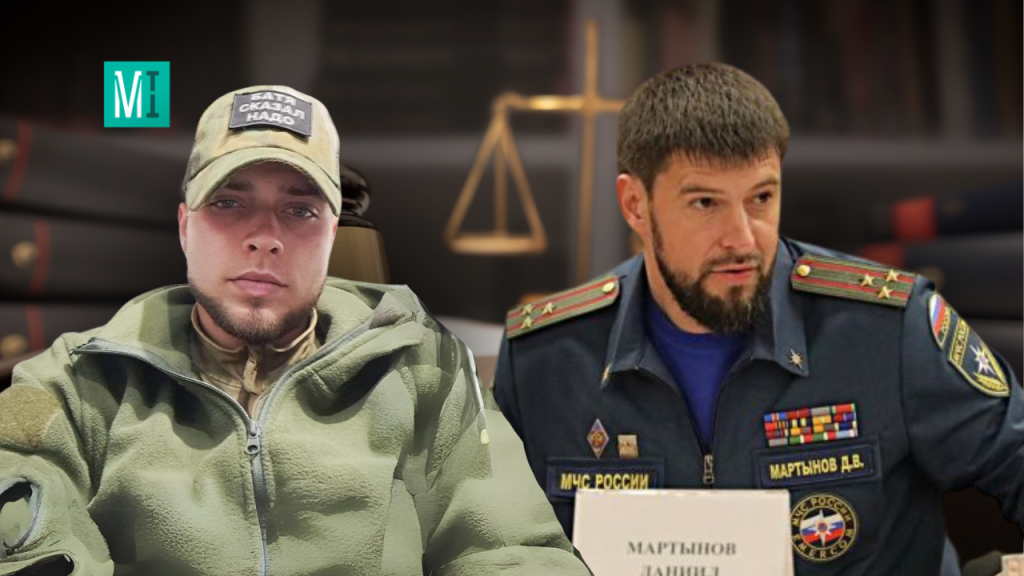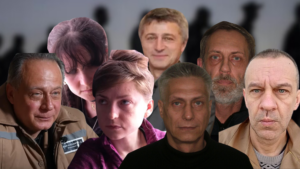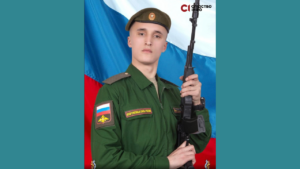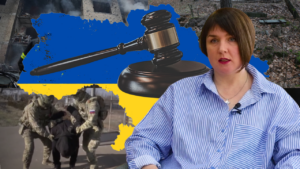Shooting of Civilians, Capture of a Nursing Home in Borodianka and Burglary are the Crimes Russians are convicted of

Three more sentences have been published in the Register of Court Decisions. They were imposed on Russian soldiers for crimes committed during the occupation and military operations. Two of them were passed by courts in Chernihiv Oblast, and one was pronounced by a judge of a Kyiv Oblast court. Two Russian soldiers were sentenced to life imprisonment for shooting civilians who were trying to evacuate. One officer received 11 years in prison for ordering to capture the Borodianka Psychoneurological Nursing Home and use 500 residents as a human shield. A Russian soldier was sentenced to 12 years in prison for robbing a house.
We reviewed these sentences together with Andrii Yakovliev, a lawyer of the JSC “Umbrella” and MIHR expert in the international humanitarian law. He explained the logic behind the sentences and drew attention to their shortcomings. More details can be found in our monthly review.
Murder of civilians
Case No. 748/259/24
On September 16, the Chernihiv District Court found Artem Tereshonkov and Vladislav Dongak guilty of the deliberate murder of two people. They are servicemen of the 90th Tank Division of the 41st Combined Arms Army of the Central Military District of the Armed Forces of the Russian Federation.
The court verdict states that on March 3, 2022, Artem Tereshonkov and Vladislav Dongak were moving in convoy towards the village of Khmilnytsia in Chernihiv Raion. A Renault Duster was driving along the same road. In addition to a driver, there were five passengers in the car. Having noticed the military, the driver pulled over. The people remained in the car. Artem Dongak, Vladislav Tereshonkov and other soldiers unidentified by investigators began shooting at the car. They fired at least 11 gun shots. Two people were killed, and two more were injured.

The car shot at by Russians. Photo: Chernihiv Oblast Police
A MIHR correspondent was present at the court hearing where they examined the video of an investigative experiment with the victims. The victims were interrogated behind closed doors. The prosecutor explained that they had decided to protect them this way — according to the expert opinion, they experienced a significant stress.
The video of the investigative experiment contains Iryna Bobrova’s explanation. The woman said that at the beginning of the full-scale invasion, she and her family had left Chernihiv for their country house in the village of Rohoshchi. They decided to leave when Russians entered the village on March 3. Iryna’s husband was at the wheel. They traveled together with their daughter, niece, and fellow villager with her son. On their way, they saw a burning column of Russian military vehicles, so her husband stopped on the roadside. At that moment, ten Russian soldiers began shooting in their direction. An armored personnel carrier was approaching them. The victim’s husband and fellow villager were killed. Russians detained those who were in the car and held them in a house nearby. The victim remembered that Vladislav Dongak had been in command of the attackers, and Artem Tereshonkov had guarded them in the house. She recognized them in the photos provided by investigators.

Artem Tereshonkov. Photo: social media
As stated in the court verdict, the victim’s daughter said that after the shooting, Russian soldiers had ordered them out of the car at gunpoint. The girl shouted at them, asking why they had killed her father. A blue-eyed soldier said he was sorry. Then they were taken into the house. Their guard was the said blue-eyed Russian, whom she later recognized as Artem Tereshonkov. She also recognized Vladislav Dongak as the soldier who had stopped the armored personnel carrier and led the group of soldiers.
The attackers were also recognized by Iryna Bobrova’s niece.
Witnesses from among village residents said that at Iryna’s request they had helped move the bodies of the dead. One of the witnesses confirmed that he had heard the conversation between Iryna’s daughter and the Russian. When she asked him why they had killed her father, he answered, “I didn’t mean to kill him.”
The accused were identified by their telephone numbers that had been recorded by base stations in the villages.

Interrogation of witnesses in the case of Artem Tereshonkov. Photo by the MIHR
The investigators also received information from a military unit of the Armed Forces of Ukraine and the State Border Service that battalion tactical groups had moved along the road past the village on the day when the civilians were shot. They included the 41st Combined Arms Army of the Central Military District of the Armed Forces of the Russian Federation, where the accused had served.
The investigators provided the court with on-site inspection reports, charged person identification reports, and reports on results of investigative experiments conducted with the participation of the victims and witnesses. A number of examinations in the case confirmed that the deaths of the people and damage to the car had resulted from the use of firearms.
In making its decision, the court noted that the accused had violated a number of requirements of the Geneva Convention relative to the Protection of Civilian Persons in Time of War of August 12, 1949, and the Protocol Additional to it.
The court found Vladislav Dongak and Artem Tereshonkov guilty under Paragraph 2 of Article 28 and Paragraph 2 of Article 438 of the Criminal Code of Ukraine. That is, they were held guilty of violation of the laws and customs of war outlined in international treaties, coupled with premeditated murder committed in concert. Both were sentenced to life imprisonment.

Vladislav Dongak, a Russian soldier. Photo: russian-torturers.com
The trial was held in absentia, since the Russians are within the territory not controlled by Ukraine. They will serve their sentences after they are arrested. As of early October, there is no information in the Register of Court Decisions about whether they have filed an appeal. The verdict can be appealed within 30 days.
Expert commentaries
According to the case materials, a group of Russians shoot at a civilian car and killed civilians. They committed a grave violation of the laws and customs of war (Article 147 of the Fourth Geneva Convention) that is considered as a war crime.
“The case was heard without the defendants. Under such conditions, the court had to determine what had caused the attack on the civilian car and that it was the accused who had shot,” says lawyer Andrii Yakovliev.
Our legal system is based on a competitive process that allows the prosecution and the defense to independently support their legal positions, guarantees freedom to provide evidence and permits the parties to present persuasive arguments to the court.
“Despite the fact that the accused were provided with a defense attorney, having no contact with the clients, he is not able to find out the purpose of the shooting and actions of the accused. At the same time, our legislation allows for criminal recognition by photo,” the expert explains.
The recognition procedure is highly detailed. The person who tries to recognize a criminal receives at least four photographs that do not differ significantly in shape or other features. One of them shows the person who should be recognized, while the others show people of the same gender, similar age, appearance, and wearing similar clothes.
This procedure is designed to ensure that the recognition process is representative and devoid of external interference. This is particularly important when considering cases in absentia.
“The current legislation does not require that the court should keep detailed records of the progress in recognition process unless a party to the trial files an objection,” says Andrii Yakovliev. “Perhaps the legislation should require the court to describe such key procedures. This could build up trust in justice if a case is heard in absentia.”
Capture of the nursing home in Borodianka
Case No. 939/1435/22
On September 12, the Borodianka Raion Court of Kyiv Oblast found Daniil Martynov guilty of having ordered to illegally hold patients and employees of the psychoneurological nursing home. He was the deputy head of the department of the Federal Service of the National Guard Troops of the Russian Federation in the Chechen Republic.
In February 2022, a number of Chechen units, led by Daniil Martynov, occupied a part of Kyiv Oblast. Under orders of Martynov, Russian soldiers were holding 500 employees and patients of the Borodianka Psychoneurological Nursing Home, including its geriatric department, from March 5 to 13. They set up a fighting position and placed military vehicles along the perimeter of the institution. People were used as a “human shield”.

Borodianka nursing home. Photo: Facebook page of the institution
Daniil Martynov also threatened the director of the nursing home with a machine gun and forced her to thank him for “liberation from the Nazi regime” on camera.
At the trial, she said that there had been 500 people at the nursing home, including patients with disabilities, sick people, employees, local residents, and children evacuated from the Vorzel clinic. About 70 soldiers of the Caucasian origin dressed in Russian uniform with St. George ribbons burst into the institution after midday on March 5. At gunpoint, patients were ordered to line up in the hall and give away their phones. People were forced to undress and checked to see if they had any tattoos. At the same time, the invaders threatened to shoot them “if they were Nazis” and were hiding Ukrainian soldiers. They also warned the hostages that they had planted mines everywhere and could blow them up.
The director of the nursing home was taken to Daniil Martynov. He said that everything would be fine and a short video should be recorded. With armed Kadyrovites standing in front of her, the woman burst into tears. Martynov got angry and demanded that she thank him. When she asked him what she should thank him for, he replied, “For being alive.” Then they turned on a video camera and he said that as a Russian commander he had come “to liberate Kyiv from the Nazis” and addressed the director. She thanked them for sparing their lives. Then they let her go. According to the victim, Russians set up their fighting positions near the nursing home and placed their vehicles there. None of the civilians were allowed to leave. The nursing home ran out of food. There was no electricity, heating or water. Over this period 12 people died due to the lack of medicines and inadequate care.
A man who worked as a carpenter at the nursing home told the court that Russians had forbidden people from leaving the institution under a threat of death during the entire period of occupation. In order to prepare food, people lit a fire inside. Martynov asked questions about the institution and wanted to know whether there were Ukrainian soldiers on its premises. The witness considered the defendant as a commander, because other soldiers followed his orders. The man also saw Russian military vehicles near the nursing home. In his opinion, occupiers deliberately placed them nearby to protect themselves from retaliatory strikes.
Similar testimony was given by seven more witnesses from among the nursing home employees. The people identified the accused as a commander. They remembered that he had introduced himself as an FSB lieutenant colonel.

Daniil Martynov, the deputy head of the Federal Service of the National Guard Troops of the Russian Federation in the Chechen Republic. Photo: Russian media
Other evidence provided by investigators to the court include reports from the SBU (Security Service of Ukraine) that a part of Kyiv Oblast was occupied by Chechen units under personal leadership of Daniil Martynov acting as an assistant to the head of the Chechen Republic for the Russian security forces. It was he who had given the order to capture the nursing home.
Using the data available in the Internet, the Cyber Police Department of the National Police prepared a biographical document on Martynov’s military activities. According to it, until 2013 he served as a member of the Alpha, an FSB special forces unit. The US imposed sanctions on him for violating human rights in December 2020.
The defendant’s social media posts and Russian propaganda publications contain information that Daniil Martynov had fought in Kyiv and Luhansk Oblasts.
The victim and two witnesses recognized Martynov in one of the four photos provided by investigators. The victim was also involved in an investigative experiment. The director of the medical institution on the spot explained about the capture of the nursing home and how she had been forced to speak in a propaganda video.
The court reviewed the photos and videos made by a person who was in the nursing home. They show Russian vehicles, damaged property and dead people.
Investigators provided a number of videos from social networks to prove that Martynov had been in Kyiv Oblast. In one of them, he is at the Prypiat stela, in another, he is reporting via a video link to Ramzan Kadyrov, the head of the Chechen Republic, about the progress in the military operation in Ukraine.

Daniil Martynov (left) with Ramzan Kadyrov (right). Photo: expertsouth website
Investigators provided satellite images for 2019 and 2022 as evidence that Russians placed military vehicles and built fortifications near the nursing home. They show vehicles and trenches that appeared near the boarding school in 2022.
The prosecutor asked the court to sentence Martynov to 11 years’ imprisonment. The defendant was represented by a defense attorney from the Free Legal Assistance Center. The attorney noted that he had not been able to discuss the case with the client. However, he asked the court to acquit the defendant due to the lack of evidence of his guilt.
In its decision, the court noted that, according to the Geneva Convention relative to the Protection of Civilian Persons in Time of War of August 12, 1949, it is prohibited to coerce civilians, take them hostage or treat them brutally. According to Article 55 of the Convention, the occupying power shall provide civilians with food and medical supplies. The court also emphasized that all combatants are obliged to comply with the norms of international humanitarian law.
As a result, the court found Daniil Martynov guilty under Par. 1 of Article 438 of the Criminal Code of Ukraine, in particular of cruel treatment of civilians, giving orders to commit such actions, as well as giving orders to commit other violations of the laws and customs of war outlined in international treaties. Martynov was sentenced to 11 years in prison. He will serve his sentence if detained, since he remains within the territory not controlled by Ukraine. As of early October, the sentence has not been appealed.
In February 2023, the mass media reported that Daniil Martynov had come to Turkey as part of the group created by the Russian Ministry of Emergency Situations allegedly to mitigate the earthquake consequences.
Expert commentaries
“Although the case summary and eyewitness testimony refer to a “human shield”, the charge is concerned with cruel treatment of civilians and illegal deprivation of liberty,” Andrii Yakovliev notes.
IHL prohibits the use of “human shields”, although Article 438 of the Criminal Code of Ukraine criminalizes all violations of the laws and customs of war. The use of a “human shield” is most clearly defined as a war crime in the Rome Statute (Article 8 (2) (b) (xxiii)).
The verdict calls attention to quite serious violations of IHL. In particular, civilians were kept in harsh conditions, with Russians actually using them as protection.
However, the defendants were not charged with using human shields, so they were not convicted for this.
In general, Ukrainian legislation fails to clearly classify the use of persons protected by IHL to protect military or certain sites as a war crime. After all, Ukraine has not yet applied the Rome Statute, where this is criminalized. Since Ukraine has not ratified the RS for a long time, there is confusion.
“We hope that after the Rome Statute implementation law comes into force, our sentences will contain more precise crime elements, including such serious violations as creation of a “human shield,” says lawyer Andrii Yakovliev.
Another interesting aspect of this case is that the accused traveled abroad. That is, theoretically, he could have been detained there. However, Andrii Yakovliev explains that things are too complicated. Interpol and Europol have restrictions on detention of people suspected or convicted of international crimes. Andrii Yakovlev says,
“Since Ukraine is not a member of the European Union, Europol’s infrastructure is not yet available to us. Although Interpol can search for those convicted of war crimes, it has limitations. In particular, before declaring a person wanted and detaining them, Interpol asks for the consent of the country of which the suspected or convicted person is a citizen.
In order to enforce a sentence pronounced in absentia, Ukraine can contact each country separately. To simplify the procedure, it is easier to submit such requests to associations of countries.
“War crimes are crimes against the global legal order, that is, against everyone. Therefore, this should also become everybody’s business,” says Andrii Yakovliev. “For example, it is worth developing a convention on enforcement of international sentences in order for each state to be obliged to detain persons declared wanted or convicted of international crimes. This could have a deterrent effect. This is because people who commit crimes would understand that they will be after in more than one state.”
Burglary during the occupation
Case No. 729/1125/23
On September 2, the Bobrovytsia Raion Court of Chernihiv Oblast convicted Rinat Minibaev of burgling civilians’ house. He is a soldier of the Separate Guards Motor Rifle Alexandria Brigade, part of the Ground Forces of the Armed Forces of Russia.
Between February 27 and March 30, 2022, Rinat Minibaev’s unit occupied the villages of Ukrainka and Novyi Bykiv in Chernihiv Oblast. According to the case materials, on March 23, Minibaev and six unidentified soldiers broke into a house in the village. They wanted to arrest a cadet of the National Academy of Internal Affairs of Ukraine who lived there, but found only his father, who is the victim in the case. Russian soldiers burgled the house and stole things worth 67 thousand hryvnias.

Novyi Bykiv on the map
At the trial, the victim said that seven Russian soldiers had entered his yard that day. They asked about his son, who studied to become a police officer. When the man answered that his son had gone to Kyiv, the soldiers broke into his house and searched it. They took his equipment, money, jewelry and rifle from the safe. It was warm in the house, so the soldiers took off their balaclavas — that is how the victim remembered them. According to him, Rinat Minibaev was “in charge”.
The victim’s son said that he had been traveling to a neighboring village that day. On his way to the village of Hurivka, he saw Russian soldiers and vehicles moving toward one of the houses. He waited for an hour and called home. His father told him that they had been robbed by Russians. Some time later, his father saw a photo of the accused on social media sites and recognized him.
Among the evidence that investigators presented to the court was a report from the Cyber Police Department about a mobile phone number that belonged to the defendant and had been registered in the village. Using the number, investigators found his profile on social media websites. Investigators also provided reports on recognition of Rinat Minibaev by the victims.
During an investigative experiment, the owners of the house described how the search had been conducted and where their items had been stolen from. The female owner is also a victim in the case. She was not in the house during the search. She stood in the yard. She noted that at first Russians had been wearing balaclavas, but they had left the house with their faces uncovered. The woman remembered Minibaev because he was the leader of the group. The Chief of Staff of the Armed Forces of Ukraine and the Department of Military Counterintelligence of the Security Service of Ukraine submitted reports confirming that Minibaev’s brigade had been among the units that occupied a part of Chernihiv Oblast at that time.
The court found Rinat Minibaev guilty under Paragraph 2 of Article 28 and Paragraph 1 of Article 438 of the Criminal Code of Ukraine, that is, of violation of the laws and customs of war outlined in international treaties, which had been committed in concert. He was sentenced to 12 years in prison. The trial was held in absentia, since the defendant remains within the territory not controlled by Ukraine. He will serve his sentence after detention. At present, the Register of Court Decisions contains no information about whether an appeal has been filed.
Expert commentaries
Analyzing this sentence, Andrii Yakovliev notes that one should distinguish between actual war crimes and other violations of the laws and customs of war. After all, burglary falls into the second category.
Andrii Yakovliev adds,
“In order to comply with the the Geneva Conventions, each state has the right to criminalize not only war crimes, but also other violations that do not constitute the said crimes.”
Anastasia Zubova, MIHR journalist







